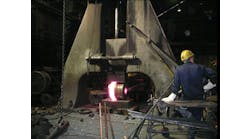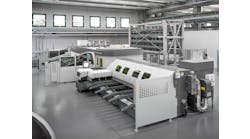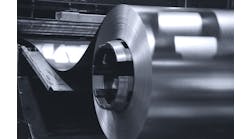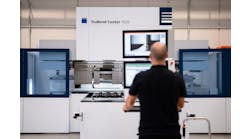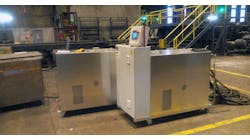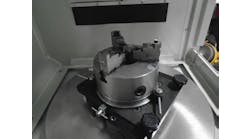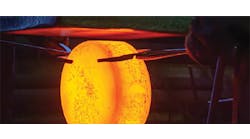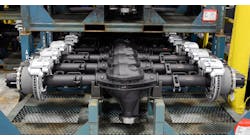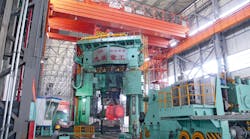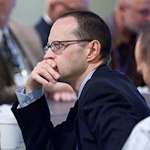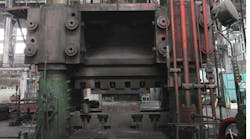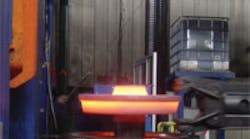China has built the world’s largest steel industry over the past 15 years, investing extensively and growing output year by year — with double-digit increases in some years. In 2012, China’s raw steel out rose just 3%, but with nearly 790 million tons produced its steel output was nearly 672 million tons more than the second-largest steelmaking nation, Japan.
Not all that steel can be rolled: some of is destined for the various forging operations that China also has invested to install in recent years.
One impressive “new” forging operation is a redesigned forging press at Taiyuan Heavy Machinery Group, a manufacturer of machinery for metal producing, mining, and hydropower plants. Its products include electrical shovels; gantry cranes; extrusion and hydraulic presses; tube mills; rolling mills; strip coating and finishing lines, and a variety of other products.
The redesigned machine is an 80-MN open-die press capable of forming hot ingots up to 4 meters thick. The press, including the manipulator that guides the ingot, required some impressive power control technology.
Powerful hydraulics
Naturally, the hydraulics for this forging press have to be powerful and fast, and the control must be highly precise. Taiyuan instructed its Bosch Rexroth, its hydraulics supplier, to design a system capable of 70 strokes per minute at a tolerance of just one millimeter.
In addition, Taiyuan has demanding expectations with respect to automation, energy efficiency, and process noise. “The challenge was tremendous,” according to Bosch Rexroth China Ltd.’s project manager, Xiangdong Kang. “We first have to accelerate the ram downward, and then instantly reverse its motion, raising it again.”
This project represented a debut for Rexroth’s engineers in China in the field of large forge presses. Their project was conducted in collaboration with the Technical Laboratory for Presses in Lohr, Germany. Planning, engineering and simulating the press design and operation with the custom-developed MOSIHS software (a Rexroth program for modular simulation of hydraulic systems) was critical to this project — ensuring that the assembly of the press and its commissioning were smooth and without incident.
But, even the most careful planning cannot guarantee that there will be no surprises. “We found on site that the system produced noise and vibrations. That called for a bold decision. We redesigned all the piping and ran simulations once again,” Kang reports.
Lingling Wang, Taiyuan’s head forging process engineer, added: “The time pressures throughout the project were tremendous. But, when I look back at the work, I am very grateful for the meticulous collaboration.”
The redesign made it possible to optimize the configuration of the piping and the valve blocks, establishing a customized hydraulic system.
In the press operation, several Bosch Rexroth A4 pumps move 10,000 liters of high-pressure hydraulic fluid into the system – each minute. Adjustable-displacement, axial-piston pumps with pressure regulation and proportional volume adjustment ensure high-energy efficiency. The entire hydraulics system is controlled by an HNC Motion Control System.
“The machinery control directs the filler and regulator valves,” Kang noted. “That results in smooth interaction between the press and the manipulator. It’s all very harmonious, but it sure packs a punch.”

